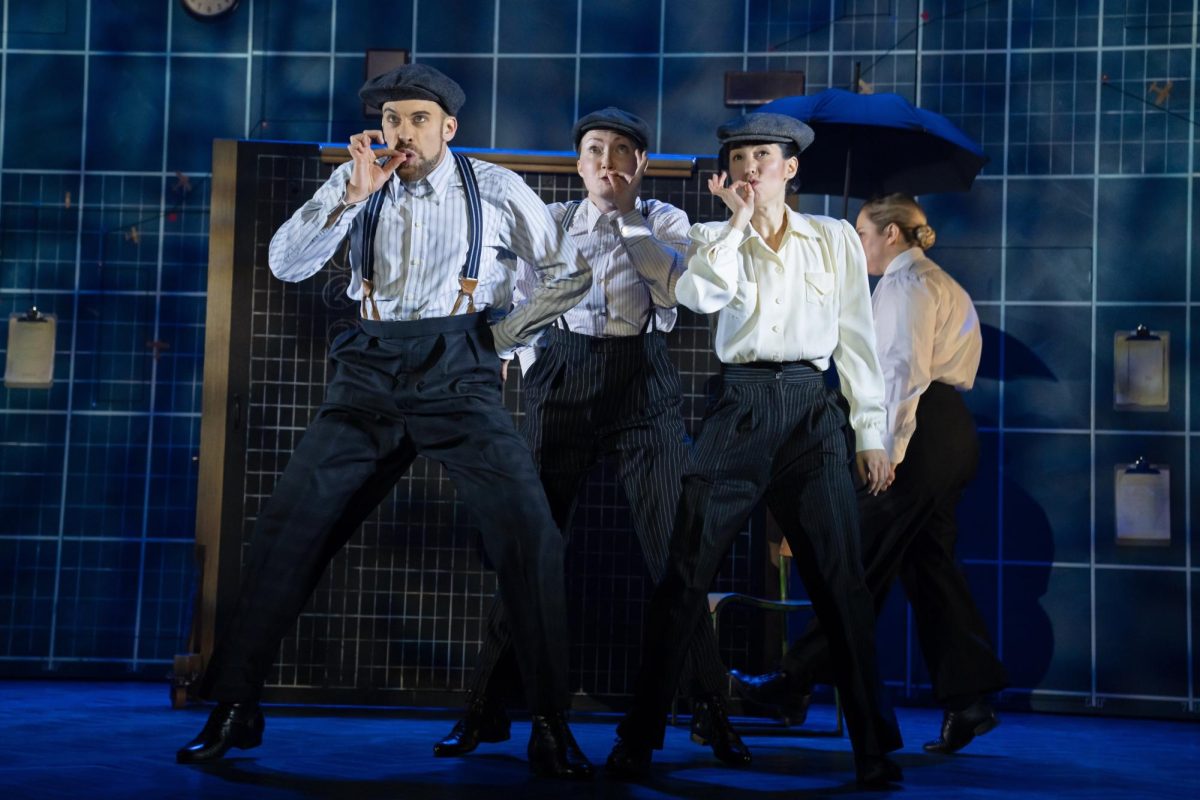The theater world is facing a British invasion. Of the 42 2024-25 Broadway shows, almost one in five have previously played in London, with countless more off-Broadway. As Paul Revere so memorably said in 1775, “the British are coming!”
This is nothing new — New York City frequently hosts transfers of acclaimed British works — but with each new show comes the question of whether Americans will be receptive to shows made for British audiences. The latest show to test that question is “Operation Mincemeat,” which tells the real story of a military spy mission during World War II through slapstick and song. However, while it won best new musical at the 2024 Olivier Awards — London’s equivalent of the Tony Awards — the musical comedy doesn’t quite stick the landing in the States.
The musical follows two British intelligence officers — Ewen Montagu (Natasha Hodgson) and Charles Cholmondeley (David Cumming) — who, desperate to drive the Nazis away from Sicily, plan to acquire a dead body, modify it to make it seem like an Allied pilot and plant it on the Spanish coast with fake invasion plans. The goal of the plan? When the Germans inspect the body, they will be tricked into moving soldiers to the neighboring island Sardinia, allowing the Allied forces to invade Sicily.
The musical comedy group SpitLip, who wrote the book, music and lyrics, jazzes up the historical story, not aiming for “Mincemeat” to be a dull history lesson. This is evident in the cast as well: The company totals only five actors that each play multiple characters, often those of opposite genders.
While the liberties SpitLip and director Robert Hastie take with the story are often fun, sometimes they go too far. They open the second act with a faux concert where the cast portray Nazi soldiers as a boy band-esque group of dancing pop stars. The number features lyrics such as “Third Reich on the mic” and is complete with Sieg Heil choreography and a brief flashing of a swastika. After the song, a cast member jokingly berates the audience for applauding and cheering for the enemy. After that, the costumes are taken off and the actors don’t depict Nazis again. But “Mincemeat” can’t have its Nazis and lampoon them too. If the audience is immoral for cheering, then so is the show for including the number.
The show also runs into issues with its elementary sense of humor. For example, instead of witty jokes, the script focuses on wacky, unexpected statements, such as Charles’ recurring lines where he blurts out ridiculous metaphors involving newts that receive decreasingly fewer laughs throughout the show’s over-two-hour runtime. It doesn’t help that Cumming plays the character with a stereotypically nerdy voice and overly exaggerated gestures — it’s hard to feel any emotional connection to him while he flails around the stage, more a caricature than a character.
Another recurring comedic sin, “Mincemeat” features an overreliance on weird voices. Hodgson is the biggest culprit of this, as it seems that she ends most of her lines in a low, gravelly voice, presumably for comedic effect. This schtick gets old quickly and distracts from her otherwise charming performance as the egotistical agent Ewen.
The one standout star is Jak Malone, who plays secretary Hester Leggatt with imperious wit and a composed stature that only crumbles during her performance of “Dear Bill.” The song begins with Hester writing a fake love letter to plant on the dead body, eventually revealing her own sad past. “Dear Bill” transforms into a powerful recollection of love and loss as Hester adds in details from her own past flame who died in World War I. Malone manages to find both heart and humor due to a character-focused performance that isn’t random or gimmicky.
SpitLip’s score propels Malone’s exceptional performance: “Dear Bill” is powerful in its musical simplicity, and Malone’s other characters sing fun, up-tempo songs that bring energy to “Mincemeat.” The rest of the score is similarly well-written, but it is unfortunately played by a tiny orchestra. Consisting of just four musicians, they can’t muster up a rich and powerful sound for the show, so moments that should feel epic are instead underscored by thin instrumentals.
In theory, the minimal orchestration makes sense for “Mincemeat,” a show that wants to be seen as a scrappy underdog: In an Instagram caption, they thank fans for “support of our little show.” But on Broadway, the show feels too small and underdeveloped. If “Mincemeat” is the best the Brits have to offer, then their invasion will have to wait.
Contact Ethan Li at [email protected].

























































































































































Dave Chambers • Apr 4, 2025 at 8:24 am
Interesting opinion.
Some might agree more with Lin-Manuel Miranda’s view – “I was in awe of the talent, creativity and stamina.”
Or maybe Stephen Spielberg’s…
Etc